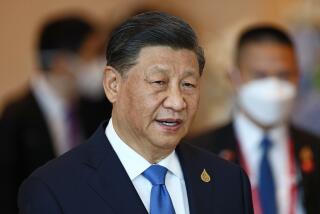China Puts Focus on Security in Muslim Region
- Share via
BEIJING — China urged local security agencies Thursday to “prepare for danger” and remain vigilant against terrorists in the predominantly Muslim northwestern region of Xinjiang.
The call by Luo Gan, the top security official on the governing Politburo Standing Committee, came just ahead of the 50th anniversary on Saturday of Communist control over Xinjiang, according to state media.
Muslim Uighur militants in Xinjiang have fought for several decades to establish an independent nation that would be known as East Turkestan.
China, which has aggressively confronted the movement, said this month that 160 people had been killed in Xinjiang since the mid-1980s in 260 attacks blamed on terrorists.
Communist Party celebrations in autonomous regions such as Xinjiang are often viewed abroad as little more than propaganda displays that include stiff officials and minority groups dancing in traditional dress. For Beijing, however, these carry far greater significance, human rights experts said.
China views these public displays not only as important assertions of its governing legitimacy but also as opportunities to signal important policy shifts in a system where decision-making is rarely transparent.
This partly explains Beijing’s keen focus on security leading up to the anniversary. This year, China also is celebrating the 50th anniversary of its takeover of Tibet, another so-called autonomous region; the Inner Mongolia autonomous region will mark its 60th anniversary in 2007.
“These are very important and sensitive dates because there are so many fault lines in China -- between the local and central government and the Han Chinese and ethnic minorities,” said Nicholas Becquelin, the Hong Kong-based research director for Human Rights in China. “To orchestrate a show of unity requires extensive preparation.”
Despite their name, China’s five autonomous regions remain firmly under Beijing’s watchful control, part of a structure adapted from the former Soviet Union’s. About 60% of Xinjiang’s population of 20 million is Muslim, who are considered an ethnic minority in predominantly Han China.
According to the state-run China Daily on Thursday, the overall security situation in Xinjiang is acceptable. But police and other security agencies should keep a sharp eye for problems and maintain “a clear mind” in combating Uighur separatists, state security chief Luo said, even as they improve their ability to fight terrorism and increase their combat capability.
These steps are important to create a “safer environment for economic growth and social progress,” Luo added.
China released a leading Uighur figure, Rebiya Kadeer, from prison March 17 and exiled her to the U.S. following years of pressure by Washington. This occurred shortly before a visit by Secretary of State Condoleezza Rice. China has a history of releasing one or two high-profile activists before major international visits.
The overseas Uighur community is relatively fractured, but analysts say Kadeer is a particular object of Beijing’s distrust because she has the stature to unify disparate groups under an international banner, in much the same way the Dalai Lama has done for Tibet.
“Her release appears to have introduced more cohesion to the community,” said Ben Edwards, a researcher with the Uighur Human Rights Project in Washington, who said the mainstream movement is nonviolent.
“The Uighur people are Muslim, but there’s no connection to the wider, broader [Islamic] jihad.”
Wang Lequan, the Communist Party secretary of Xinjiang, said last month that Kadeer was plotting from abroad to sabotage Saturday’s anniversary celebrations. Amnesty International says local authorities have harassed and detained the businesswoman’s family.
In the post-Sept. 11 world, China has labeled many in the Uighur separatist movement as terrorists, part of a global trend by governments to deflect international criticism of internal crackdowns.
“There is no real definition of a terrorist in Chinese criminal law,” said Anu Kultalahti, a London-based campaigner with Amnesty International. “We definitely know of people charged with crimes related to terrorism or employing evil forces who we consider prisoners of conscience.”
Liu Wenzong, a member of the China Society for Human Rights Studies, said that although most people in Xinjiang were peaceful, a small minority had links to the Taliban in Afghanistan.
“We’re talking about terrorists,” he said.
More to Read
Sign up for Essential California
The most important California stories and recommendations in your inbox every morning.
You may occasionally receive promotional content from the Los Angeles Times.










